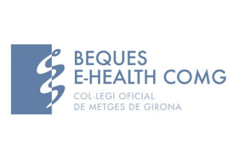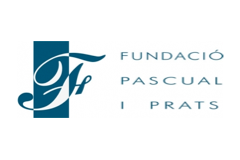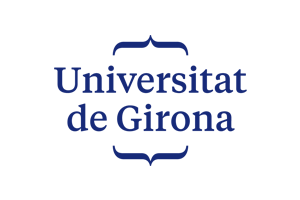E-Health Blue Prescription
E-Health Blue Prescription is a study that evaluates whether the practice of sustainable activities in the sea and on the coast, such as walking along the sea, swimming or snorkelling, can promote the health and well-being of oncological patients.
The project has been carried out by different institutions and collaborators:
Coordination:
Dr. Eva Fontdecaba (Inst. Català de la Salut)
Dr. Josep Lloret (University of Girona)
University of Girona (UdG)
Dr. Joan San
Mr. Arnau Carreño
Ms. Stefania Minuto
.png)
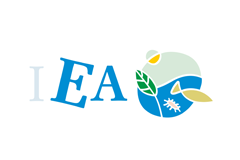
.png)
.png)
Catalan Institute of Health:
Dr. Cristina Vendrell (EAP Roses)
Ms. Mercè Homs (EAP Roses)
Ms. Laia Combis (EAP Roses)
Dr. Montse Lloveras (EAP Montilivi-Vila Roja i Grup de Professionals per la Promoció de la Salut de Girona)
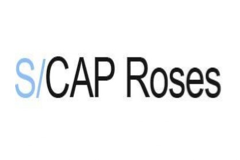
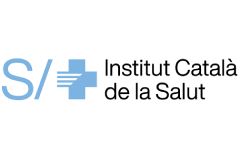
Catalan Institute of Oncology, ICO:
Dr. Angel Izquierdo

Corporació de Salut del Maresme i la Selva:
Dr. Olga Enciso
Ms. Sílvia Rams
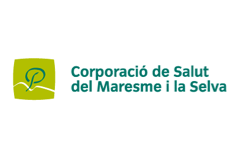
Autonomous University of Barcelona
Dr. Sílvia Gómez
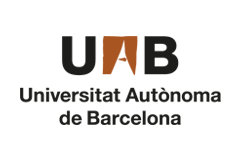
Partners:
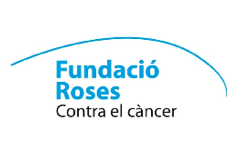
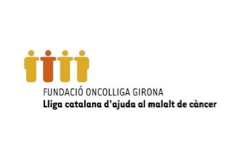
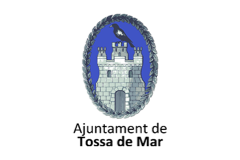
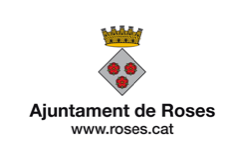
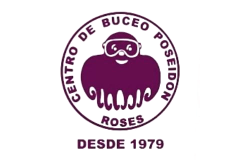

Background and purpose
There is growing evidence that being in contact with blue spaces (seas, oceans, rivers and lakes) can promote people's health and well-being.
"E-Health Blue Prescription" is a project that aims to assess whether snorkelling, swimming/bathing and walking by the sea, in well-protected natural environments, can contribute to improving the health and well-being of oncological patients; in order to substantiate the recommendation of these activities as a tool in health promotion.
For marine ecosystems and recreational activities in the sea to be considered as health assets, it is necessary that the community itself, patients and health professionals identify them as such.
Methodology
The project has been carried out by a team coordinated by the Catalan Institute of Health and the Oceans and Human Health Chair. These are the steps that have been followed:
Training programme for a multidisciplinary team that involves researchers - family doctors (primary care centres of Roses and Tossa de Mar in the Costa Brava), oncologists (Catalan Institute of Oncology), marine biologists (Oceans and Human Health Chair) - and the community - patient associations, diving centres - in research activities.
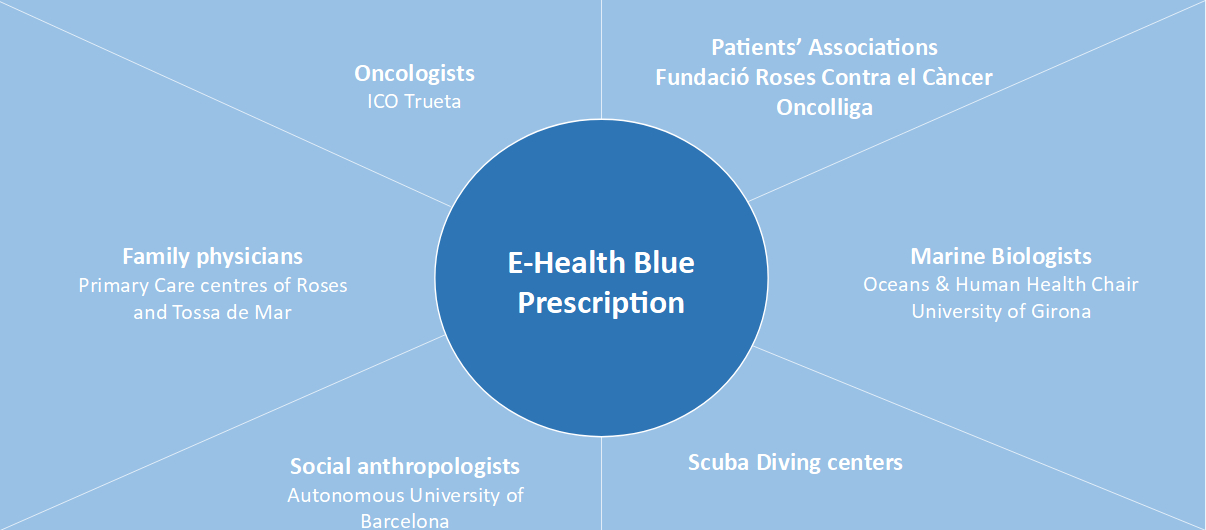
This team has given a multidisciplinary and holistic vision of the health-environment binomial to move towards health promotion initiatives based on environmentally sustainable maritime activities.
2. Planning a study to assess how environmentally sustainable maritime activities environmentally sustainable such as swimming, snorkelling and seaside walks in well-preserved environments can contribute to improving people’s health and well-being who have suffered from cancer.
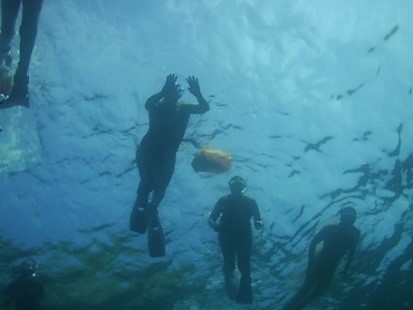
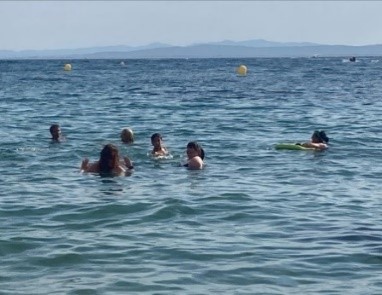
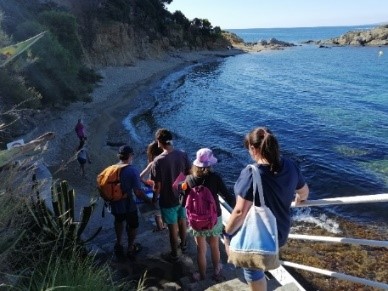
The study has been carried out for two years and it has compared the effect of 3 interventions in well-preserved blue spaces – walking by the sea, swimming/bathing and snorkelling – with no intervention (being in a room doing nothing).
The global study included 24 participants, with a history of neoplasia, aged between 35 and 70 years: 12 participants in Roses (11 women and 1 man) in 2020 and 12 participants in Tossa de Mar (8 women and 4 men) in 2021.
Each of the study participants has been subjected to four sessions of each activity, that is, 4 sessions of control or no intervention, 4 sessions of walking by the sea, 4 sessions of bathing/swimming and 4 sessions of snorkelling (in total 16 sessions).
The main methodology has been based on the use of smart watches, to record data on different health variables, before, during and after performing the activities of walking by the sea, swimming/bathing and snorkelling. These variables were: heart rate (HR) and sleep quality, complemented with blood pressure measurements with sphygmomanometers. Furthermore, data obtained from emotional well-being questionnaires POMS (Profile of Mood States) were gathered..
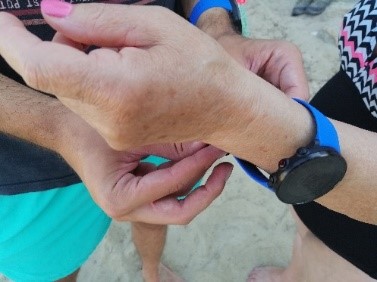
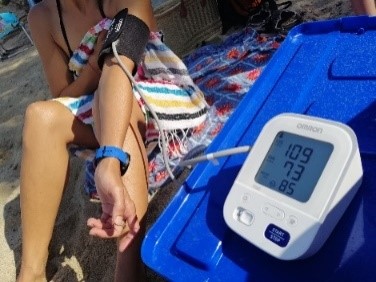
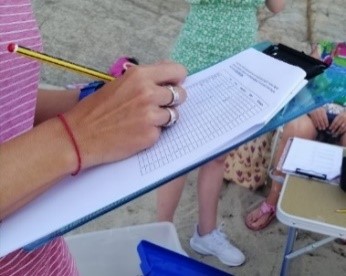
It has been evaluated if there was a gradient of positive benefit according to the degree of exposure to the sea, that is, to see if the practice of snorkelling provides greater benefit for the health and well-being of the patient than swimming or walking near the sea.
3. Design of a Blue Prescription for application in Primary Health Care Centres.
*Written informed consent has been obtained from the study participants, authorizing the publication, reproduction and dissemination of images on paper or on the Internet*.
Ethical responsibilities
The confidentiality and anonymity of the data is ensured in accordance with the provisions of Regulation (EU) 2016/679 of the European Parliament and the Council of April 27th on Data Protection (RGPD) and the national regulations applicable to both the execution phase as well as in the presentations or publications that derive from the study.
Results
POMS questionnaires: Tendency to improve emotional well-being scores as one moves towards an activity more in contact with the sea, which marks a positive gradient.
The practice of snorkeling brings more benefit than bathing and this one more benefit than walking by the sea.
Conclusions
The practice of snorkelling, swimming/bathing and walking by the sea in well-preserved blue spaces provide health benefits in cancer patients. This supports the recommendation of these activities as health assets.
Multidisciplinary work allows the integration of health-blue spaces in initiatives aimed at the well-being of the community while maintaining the sustainability of the marine environment and the coast.
Results obtained in this project encourage further research along the same direction, combining the use of smart watches and emotional well-being questionnaires.
Interdisciplinary and cross-sectoral approaches, such as the one we have presented in this project, are needed to assess how sustainable recreational activities in blue spaces can play a role in promoting people health and well-being, especially those who have suffered from a disease such as cancer, in order to identify them as health assets in our community.
Based on the results achieved, the project aims to lay the foundations for implementing a "Blue Prescription" that contributes to a salutogenic approach to primary care consultations, highlighting the role of blue spaces in generating health, and not just focusing medical attention on the disease.
The “Blue Prescription” could be established within a Community Social Prescription program, in a similar way to the so-called “Green Prescriptions” that are being developed in countries such as Scotland.
The practice of snorkeling, swimming/bathing and walking by the sea provide significant health benefits in cancer patients. This supports their recommendation.
Multidisciplinary work allows the integration of health-blue spaces in initiatives aimed at the well-being of the community, contributing to the sustainability of the use of the marine environment and the coast.
Results obtained encourage further research, combining the use of smart watches and emotional well-being questionnaires.
Financial support
This project has been financed with an “E-Health-COMG” 2020 grant for Research and Technological Innovation Projects in Health, granted by the Official Medical Association of Girona, the Pascual i Prats Foundation and the Health Campus of the University of Girona.
